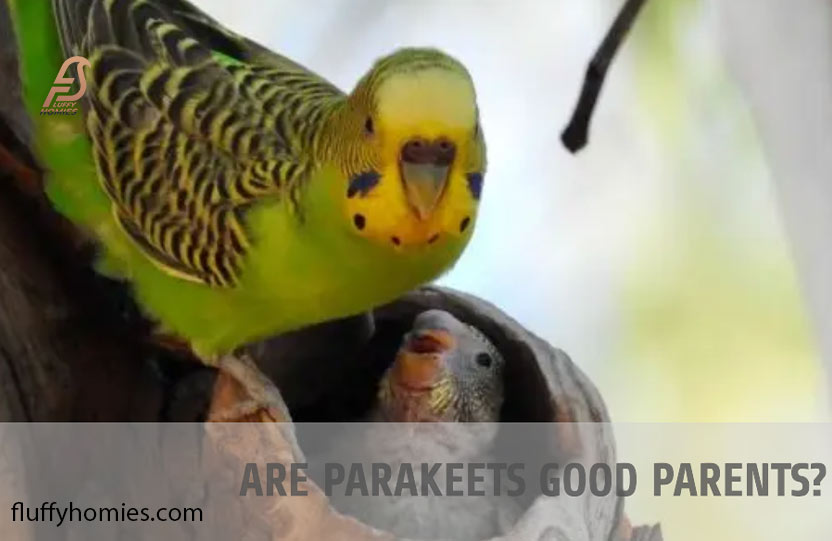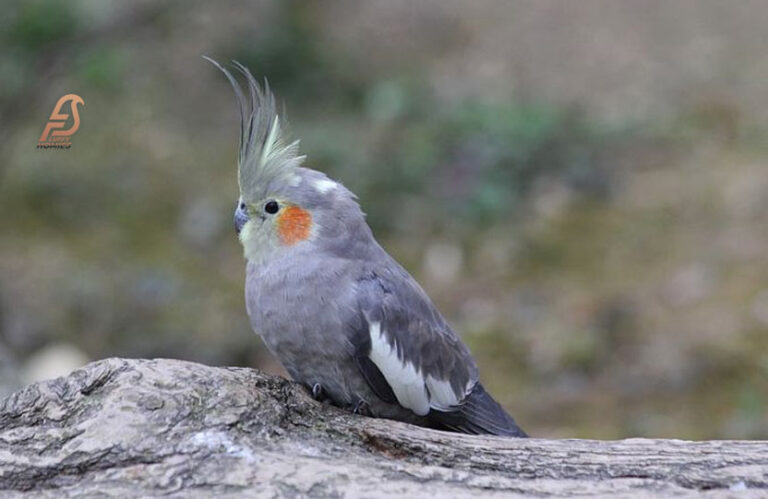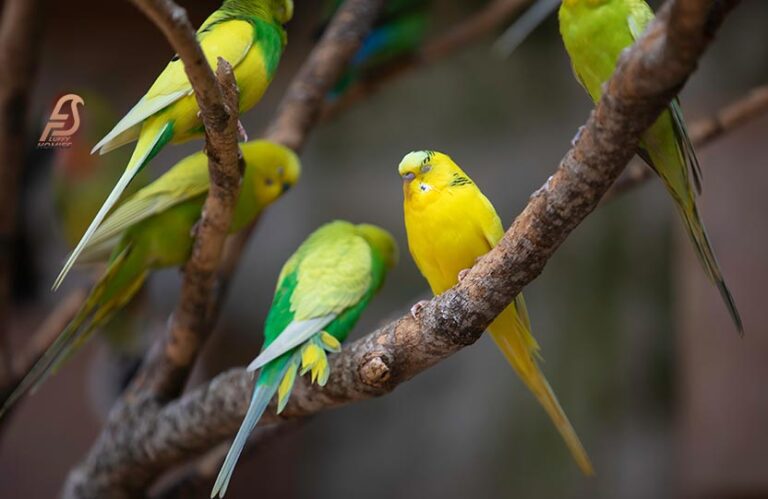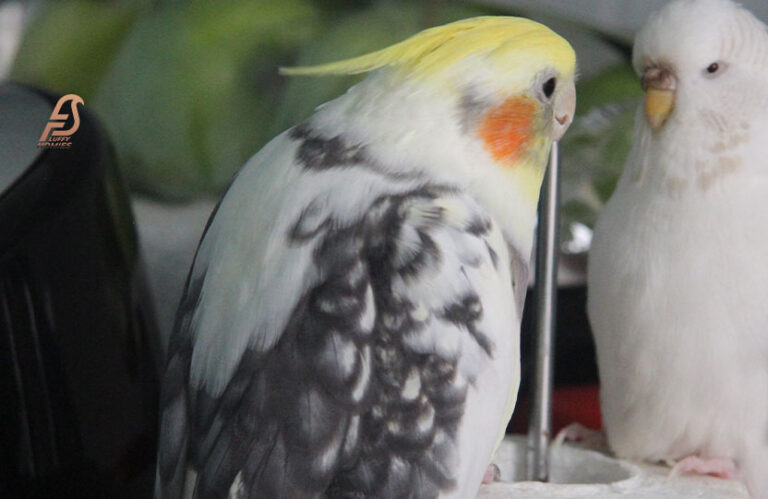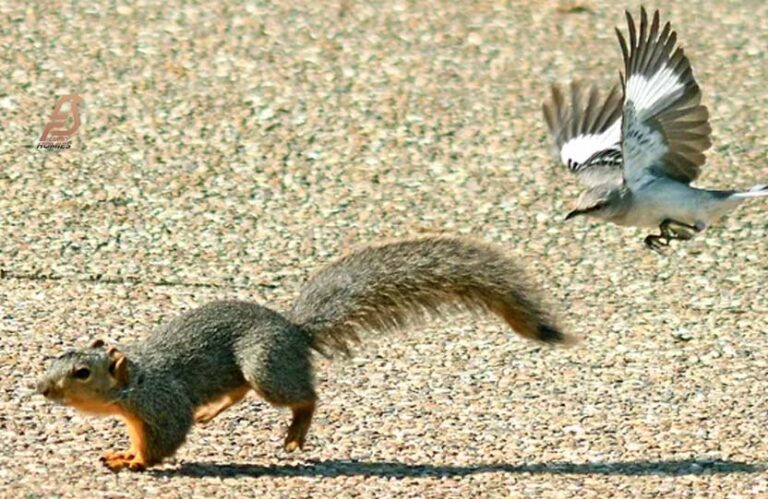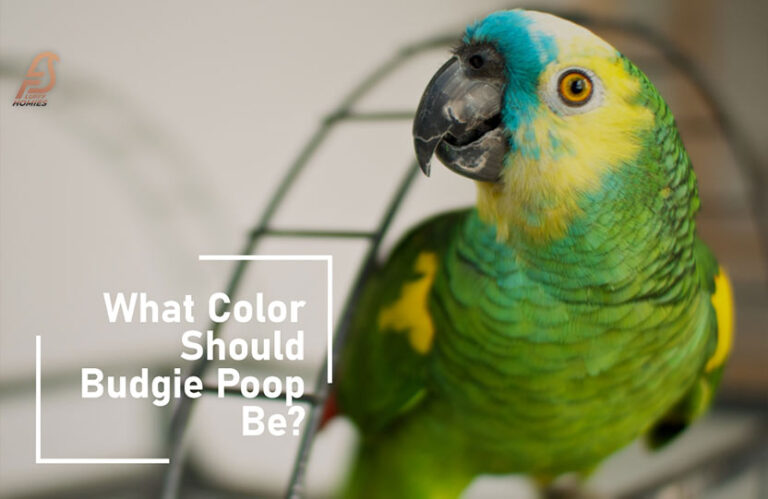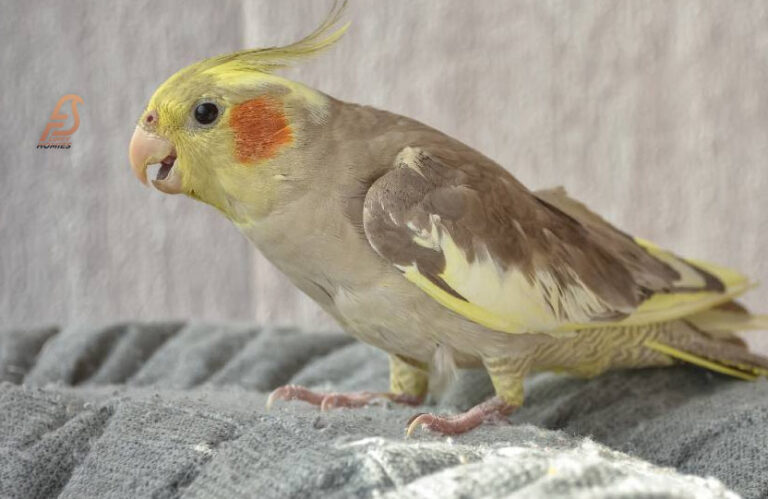Are Parakeets Good Parents? (What You Need to Know in 2023)
Are parakeets good parents? This is a question that many bird owners and enthusiasts ask.
Parakeets, also known as budgies, are popular pets because they are small, easy to care for, and can be very affectionate.
However, when it comes to their parenting abilities, some people may have doubts.
In this article, we will explore the parenting behavior of parakeets and answer some frequently asked questions about their parenting abilities.
Are Parakeets Good Parents?
Yes, parakeets are good parents. They are known for their excellent parenting skills. When a female parakeet lays eggs, both the male and female birds take turns incubating them.
They will sit on the eggs for about 18-21 days until they hatch. Once the eggs hatch, the parents will feed and care for the chicks.
They will regurgitate food to feed the chicks until they are old enough to eat solid food on their own.
Parakeets are also known for their protective instincts. If they feel that their nest or chicks are being threatened, they will become aggressive and may even attack the perceived threat.
This is why it is important to provide parakeets with a safe and secure environment for breeding.
Parakeet Breeding Behavior
Breeding parakeets can be a rewarding experience, but it is important to understand their breeding behavior to ensure a successful outcome.
Here, we will discuss the various aspects of parakeet breeding behavior in detail.
Mating Behavior
Parakeets are monogamous birds, which means they pair up with a mate for life. When parakeets are ready to mate, they display various courtship behaviors.
The male will often bow down and bob his head, while the female will respond by fluffing her feathers and tilting her head. They may also chirp and sing to each other.
Nesting Behavior
Once the parakeets have mated, they will start to look for a suitable nesting site. They may start by inspecting different areas of the cage or aviary. Once they have found a suitable location, they will start to build their nest. Parakeets will use a variety of materials to construct their nest, including twigs, leaves, and grass.
Egg-laying Behavior
Parakeets will lay their eggs in the nest they have constructed. They will typically lay between 4 and 6 eggs, which will be incubated for around 18 days.
During this time, the female will sit on the eggs to keep them warm and protect them from harm. The male will usually help to provide food and protect the nest.
Chick-rearing Behavior
Once the eggs hatch, the parents will take turns feeding the chicks. The chicks will be fed regurgitated food, which the parents will deposit directly into their mouths.
The parents will also keep the chicks warm and protect them from predators. As the chicks grow, they will become more independent and will start to explore their surroundings.
Weaning Behavior
After around 4 to 6 weeks, the chicks will start to fledge and leave the nest. At this point, they will still rely on their parents for food and protection.
However, as they become more independent, the parents will start to wean them off their regurgitated food and encourage them to eat on their own.
Parakeet Parenting Behavior
Parakeets are social and intelligent birds that exhibit a range of parenting behaviors.
Both male and female parakeets take part in raising their young and often work together to ensure the safety and survival of their offspring.
Nest Building
Parakeets begin their parenting journey by constructing a nest. They use their beaks to gather materials like twigs, leaves, and grass to weave together a cozy and secure home for their eggs and chicks.
Incubation
Both male and female parakeets take turns incubating their eggs. The female typically sits on the eggs during the day, while the male takes over at night.
This ensures that the eggs are kept warm and protected around the clock. The incubation period usually lasts about 18 to 21 days, depending on the species.
Feeding
Once the eggs hatch, both parents take on the responsibility of feeding and caring for the chicks. They regurgitate food into the chicks’ mouths and keep the nest clean by removing waste and debris.
Parakeet chicks need to be fed every few hours and require a diet rich in protein and calcium to support their growth.
Protection
Parakeet parents are fiercely protective of their young and will defend them from predators and other potential threats.
They will aggressively dive-bomb anything that they perceive as a danger to their offspring, including other birds and humans.
Socialization
As the chicks grow and develop, the parents teach them important skills like flying, foraging, and socializing with other birds.
Parakeet chicks learn by observing and mimicking their parents’ behavior, and the parents are patient and nurturing in their teaching approach.
Fledging
After several weeks, the chicks will begin to leave the nest and learn how to fly. This process, known as fledging, can be risky for young birds, as they are vulnerable to predators and accidents.
However, the parents continue to protect and care for their offspring during this stage until they are fully independent.
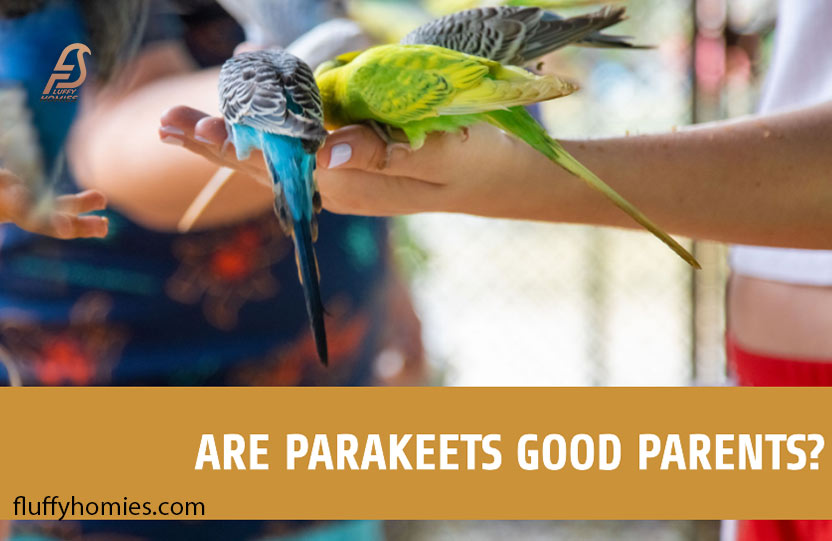
Factors Affecting Parakeet Parenting
Several factors can affect the parenting behaviors of Parakeets.
Age of the Parakeets
Young parakeets may not be mature enough to engage in proper parenting behavior, while older parakeets may have health issues that affect their ability to care for their young.
Genetics
Parakeets that have been selectively bred for certain physical or behavioral traits may be more or less suited for parenting.
Nutrition
A parakeet’s diet can affect their health and ability to care for their young.
A well-balanced diet that includes plenty of fresh fruits and vegetables, as well as a good quality seed mix, can help ensure the health of both the parent birds and their offspring.
Nesting Material
Providing appropriate nesting material, such as shredded paper or coconut fiber, can encourage parakeets to build nests and care for their young.
Cage Size
The size of the cage can affect a parakeet’s ability to parent. A cage that is too small may cause stress and prevent the birds from engaging in natural parenting behaviors.
Environment
A calm and quiet environment can help parakeets feel safe and comfortable, which may encourage them to engage in parenting behaviors.
Health
Parakeets that are in good health are more likely to be successful parents. Regular check-ups with a veterinarian can help identify and treat any health issues that may affect a parakeet’s ability to care for its young.
Experience
Parakeets that have successfully raised young in the past may be more likely to be successful parents in the future.
Related Articles
- Can Budgies Kill Each Other?
- Why Are My Budgies Feet Hot?
- When Do Pigeons Molt?
- Do Pigeons Die After Mating?
- Why Is My Budgie Panting?
Signs of Good Parakeet Parenting
Clean and Spacious Cage
A good parakeet parent will provide a clean and spacious cage for their bird. The cage should be cleaned at least once a week, and fresh food and water should be provided daily.
Nutritious Diet
A healthy diet is crucial for a parakeet’s well-being. A good parakeet parent will provide a varied diet that includes seeds, pellets, fruits, and vegetables.
Avoid giving your bird foods that are high in fat, salt, and sugar.
Chick Growth
A good parakeet parent will ensure that their chicks are growing at a steady rate and are healthy. This means that they are being fed enough and are receiving the necessary nutrients.
Regular Exercise
Parakeets are active birds and need plenty of exercises. A good parakeet parent will provide toys and perches to keep their bird active and engaged.
You can also let your bird out of the cage for supervised exercise and playtime.
Mental Stimulation
Parakeets are intelligent birds and need mental stimulation to stay healthy and happy. A good parakeet parent will provide toys that challenge their bird’s mind, such as puzzle feeders and interactive toys.
Bonding Time
Parakeets are social birds and need interaction with their owners. A good parakeet parent will spend time bonding with their bird, talking to them, and offering affection.
Feeding Frequency
Parakeet chicks need to be fed frequently, so a good parent will ensure that they are fed every 2-3 hours during the day. As the chicks grow, the frequency of feeding can decrease.
Health Monitoring
A good parakeet parent will monitor their bird’s health closely and take them to the vet if they show signs of illness. Regular check-ups are also important for maintaining your bird’s health.
Safety Measures
Parakeets are curious birds and can get into trouble if they’re not supervised.
A good parakeet parent will ensure that their bird’s environment is safe and free from hazards such as toxic plants, open windows, and other pets.
Potential Challenges During Parakeets Parenting
While parakeets are generally great parents, there are some potential challenges to be aware of.
Inexperienced or first-time parents may struggle with feeding and caring for their young and may require some guidance or intervention from their owners.
Another challenge to consider is the risk of inbreeding, which can lead to genetic defects and health problems in the offspring.
If you plan to breed parakeets, it’s important to carefully select healthy and genetically diverse breeding pairs.
Conclusion
Parakeets are excellent parents who take great care in raising their young. They are highly attentive, protective, and communicative, and will do everything in their power to ensure the safety and well-being of their offspring.
By providing them with a safe and comfortable environment, and ensuring they have access to high-quality food and water, you can help support their parenting behavior and raise healthy chicks.
While there are some potential challenges to be aware of, parakeets are generally well-equipped to handle the demands of parenthood.
So, if you’re thinking about getting a pet parakeet, rest assured that you’re choosing a companion who will make you a loving and devoted parent.
FAQs
Do parakeets take care of their babies?
Yes, parakeets take care of their babies. Both the male and female parakeets take turns incubating the eggs and feeding the hatchlings. They also teach their offspring how to fly and forage for food.
How long do baby parakeets stay with their mother?
Baby parakeets typically stay with their mother for around 4-6 weeks after hatching. During this time, the mother continues to feed and care for them until they are ready to leave the nest and fend for themselves.
Are parakeets loyal to their mates?
Yes, parakeets are generally monogamous and exhibit strong pair bonding with their mates. They can become very loyal and devoted to each other.
Can baby parakeets stay with their parents?
Baby parakeets can stay with their parents for several weeks after hatching, during which time the parents will care for and feed them until they are fully weaned.
